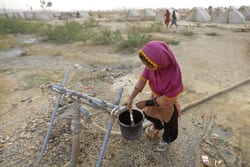The crisis in Pakistan is far from over and could get worse, international aid agency Oxfam warned today, six months on from the nation’s devastating floods. In a report, “Six months into the floods” the agency warned that millions of people were still in dire need and that the situation could deteriorate further. The report says that although the aid effort has reached millions, it has struggled to match the immense scale of human need.
The crisis in Pakistan is far from over and could get worse, international aid agency Oxfam warned today, six months on from the nation’s devastating floods.
In a report, “Six months into the floods” the agency warned that millions of people were still in dire need and that the situation could deteriorate further. The report says that although the aid effort has reached millions, it has struggled to match the immense scale of human need.
 |
| Reshma, 10 years old, from Qambar Shahdadkot, who currently lives in Shahbaz camp with her extended family who were displaced by the flooding. View more 6 month on photos on Flickr. |
Pakistan’s floods are the biggest emergency of recent times, with more than 18 million people affected, but funding for the response has been woefully slow. The UN appeal for US$2 billion to rebuild Pakistan remains only 56 per cent funded.
Six months after the rains, hundreds of thousands of people remain in camps and thousands are living in tents beside their destroyed homes. Sub-zero winter temperatures have increased the incidence of chest infections including influenza and pneumonia, with over 200,000 cases reported in the second week of January alone. In the south, swathes of land – both homesteads and agricultural – remain under contaminated water and Oxfam is concerned that already worrying pre-flood malnutrition rates have risen.
Neva Khan, head of Oxfam in Pakistan, said, “Six months on millions of people are still facing flood water, shivering in temporary shelters and struggling to find food. Oxfam is helping nearly 1.9 million people – one of our biggest programmes worldwide – but this is dwarfed by the number of people who are in need.
“The aid community has done a tremendous amount, but given the immense scale of this disaster we have only scratched the surface of human need.”
Oxfam is urging the government of Pakistan to extend the emergency period until peoples’ needs are met. The Pakistan government is due to stop emergency relief operations in most areas from January 31, 2011, but Oxfam warned that this could put at risk large numbers of people who still need assistance.
It is vital to learn the lessons of this disaster and seize the chance to re-build Pakistan better, specifically by providing land for landless labourers, creating better facilities for girls in schools and investing more in disaster management down to the local level. Many landless farmers are scared to go home due to debts owed to their landlords, often for the crops that were washed away in the flood.
Still a chance to step out of the disaster spiral, says agency
Khan said, “If Pakistan invests in disaster risk reduction then the devastation wrought by this disaster could be consigned to history. With bold steps – like redistributing land – a fairer and stronger country could emerge. We must seize this chance to address the causes of inequality and poverty, and build back a better and more resilient Pakistan.”
 |
| Read our 6 month on report (PDF, 497 KB) |
Oxfam also warned that action was needed now to prevent a secondary food crisis. Agriculture was particularly hard hit in the flood with over 2.2 million hectares of crops lost. Most farmers missed the last planting season in November, some because their land was still underwater, but others because they did not get seeds or other agricultural supplies in time. The April farming season is likely to be missed as well unless urgent action is taken to rehabilitate fields and distribute seeds and tools to farmers.



